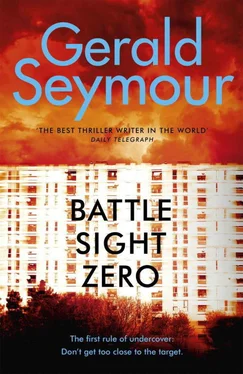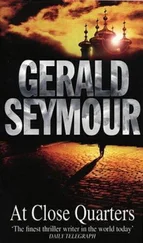‘You do not have to be sorry.’
‘And am sorry for shooting into your ceiling, for making debris.’
The plaster that had come down from the ceiling was almost a metre square and pieces of it were on the bed, and the dust had hung in the air then floated down and she did not know that her skin had a fine coating of it, which gave her a pallor and her cheeks and hair were the colour of an old woman’s.
‘My room is a dump. No one would notice.’
‘And sorry for barging into your life.’
‘And bringing confusion?’
She had thought herself a revolutionary, a soldier in an army and proud of where she marched. She was not in the ranks of masked cohorts and heading towards a battle-front but was holed up in a squalid apartment in Arab France, alongside the crippled younger brother of a second-tier drugs dealer.
‘Bringing confusion, yes – and leaving a trail behind me, wreckage.’
‘Can I ask you…?’
‘Ask.’
‘What is it like? To fire it, how is it? Is it good, is it…?’
‘It is wonderful, it is better than good. It is incredible.’
‘Better than…?’ The boy sniggered.
‘Better than that. You want to?’
‘I want to fire it. I would like to.’
‘Another way that I am sorry. For what I did to your books. That was a crime to destroy them, it was as if I had stolen them, or worse, because it was temper and destructive, and I gained nothing from it. I am sorry… I hope that after I am gone you can forget me – then, one day, sometime, you will see my picture in a newspaper, across the width of a TV screen, and you will remember me.’
The boy kissed her. Zeinab had thought that the perfect kiss, soft lips on her skin and the rub of rough stubble, was when she had been with Andy Knight, police spy and liar – doubted that now. So hesitant, and treating her as a princess, the daughter of an emir, and in wonderment about being permitted that close. A brush of his lips, and his eyes closed as if he did not dare to gaze on her, that it would show disrespect. They stood a long time together, her stomach against the boy’s, her chest against his, and the moisture of his mouth on her cheek, and he stirred, and she wondered if he would then push her back, let her fall, use his weight against her so that she was on the bed, and wondered whether she would then spread her legs and reach for the belt at her waist, and wondered… He had broken free from her, and was glancing at his watch, and frowning, anxiety ploughing lines on his forehead.
‘We can go?’
‘Yes, can go.’
‘And we talk no more about “sorry”?’
‘No more.’
‘Give it me.’
She did. He took it with both hands, then laid it on the crumpled bed. His fingers moved at speed. The magazine detached, the bullets spilled out, counted, all nine replaced, and the second magazine checked, and went back on to the belly of the weapon, then the rest of its working parts. She thought at first it was conceit, to show his knowledge, then was kinder and realised that he tested himself to see how well he had mastered the books that now lay on the sodden ground outside where – because of her – they were, muddied and useless. It went together again and the work was done flawlessly and he betrayed no moment when he might have forgotten what fitted where. He aimed it at the window and checked the sight, adjusted it minutely. She followed the aim and saw only the dark mass of the cloud that carried the rain in off the Mediterranean sea. She could see no target. Perhaps he imagined one, perhaps an enemy stood in front of him, perhaps he was about to be overwhelmed by those hating him. He fired. She saw the trigger freed and come back and the cartridge case flashed, then tinkled on the linoleum. Just two shots and the manhood was in his face and the smile spilled. He handed it back to her.
‘For the confusion and the wreckage, I am sorry.’
‘For nothing. We go, I take you out.’
‘Go how far?’
‘Who knows… till the gas runs out, then buy some more. I think, sister, you can make a man reckless, forget how to be clever – or partly you and partly the work of the rifle.’
‘A last time… You have trust in what is told you?’
‘Of course, he is my brother.’
‘I trusted once.’
‘He is my brother. Why would I not trust him?’
On the balconies of La Castellane’s tower blocks, after two more shots that had howled across the road and the slope and over the car park of the shopping centre before falling spent, the murmur of the question was waves on pebbles, but went unanswered.
‘Have you seen him… Has anyone seen him… He must be here, he would not stay away, would he… He would bring the big rifle, the killing rifle, yes… He saved that boy’s life, Karym’s, would he now take it… Saved his life with a master shot, but does anyone think he has emotion… He will kill, of course he will, was there ever a man so cold?… Has no one seen Samson, we should keep watching for him? Heh, where are you, Samson?’
Words rippling from the balconies, spoken quietly as eyes strained, and many more were asking the same question on the top of the far slope and among the empty bays of the shopping area parking lot. A great expectation that they would not, any of them, be disappointed.
A stranger was by his shoulder, wearing the wrong gear for the weather and soaking up the rain. Samson, the marksman, eased a plastic bag off the rifle, drew it clear of the telescopic sight. Tucked in his sleeve was a small square of thin towelling with which he could wipe the lens, prevent it fogging. He adjusted the sight for the range he expected when the opportunity came. The Major would make the call and had control of the big spotlight sited ten or so metres behind him. He had no qualms about the use of deceit, no hesitations about the use of lies to further political or counter-terrorist necessity… Samson would have said that the law of the jungle was writ large when in close proximity to this project or any other: he doubted that a lioness or a cheetah, a tigress or a leopard, a jaguar or a lynx, would quibble at the use of subterfuge. There was a bullet in the breech and a radio piece in his ear, and the stranger was close to him but would not impede. He felt calm, no different to any other evening, the same as when he had been out in the rain and on the pavement and waiting for his daughter to come from late-night music lessons at the school, the Lycée Colbert, in the 7th arrondissement off Rue Charras: a quiet and respectable neighbourhood and one in which few home-owners spent their evenings lying prone in the wet, dabbing the lenses of a telescopic sight, waiting for a target to come into view. He made no judgements, would have claimed that to be the duty of men and women who lived far above his pay grade. He had the Steyr SSG 69 with the 7.62 × 51 NATO-compatible round, nestled and ready. It was a military weapon and in his mind this was a military operation: achieve an end, or fail to. And he thought the stranger beside him also held his calm well. A bike’s engine throbbed into life, far away but clear.
They were at the back of a wagon.
Not often that Gough had the chance to watch a culmination, when he supposed there would be a ‘whiff of cordite’ in the air.
The Major said, ‘You stay here, do not move, and you see nothing, hear nothing and know nothing of what might happen. You are surplus and remember it.’
He was gone.
Pegs gripped Gough’s arm. ‘That bastard has a good bedside manner. A real comforter.’
‘It’s a dirty business that we trade in, to the exclusion of pleasantries. We are not the ones that matter at these moments. The men, women, who go the extra yards, go alone, the “uncivilised” men. What Orwell said. Men can only be highly civilised while other men, inevitably less civilised, are there to guard and feed them . We owe them much, the uncivilised, and should not forget it.’
Читать дальше












